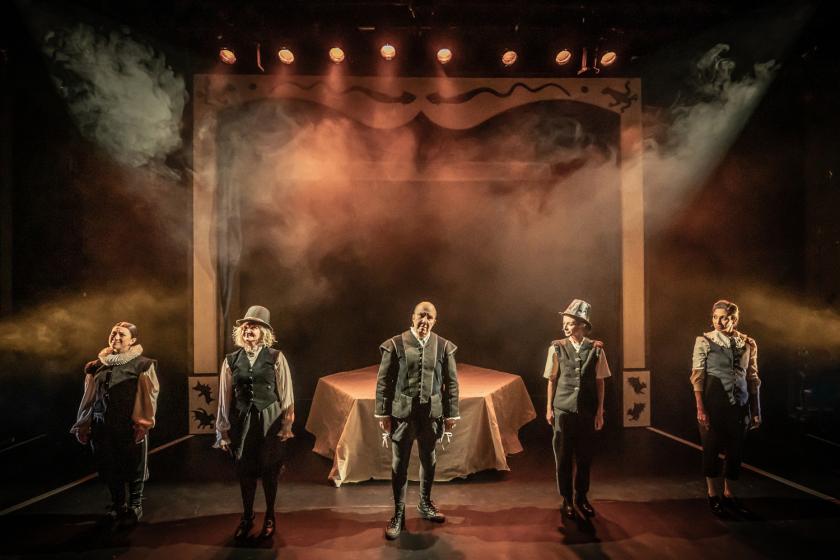In 2020, throughout the country, many people’s lives were affected adversely by an ever-present threat to our already fragile society. Though most got over it, many people still bear the cost every day, sapping them of energy, making them cough and splutter frequently, instilling a longing that it would just go away and stay away.
Like many, I have been suffering from “Long Boris”, the affliction reactivated last week with his appearance as the Covid Inquiry Variant spread far and wide. And such topicality ought to work in favour of Armando Iannucci’s first venture on to the stage, Pandemonium, but, even with the equally bankable Patrick Marber in the director’s chair, it soon feels forced and tired, the ageing jokes and the tropes having appeared once as tragedy and many, many times as farce. If you’re still milking the mussed-up hair for laughs and calling back to the “Leave” and “Remain” drafts that captured Johnson’s cynical self-serving politics, you’re an election cycle too late, the game four years afoot and counting. It’s not all as tired as that of course. Our Pandemonium Players, in Shakespearean garb, greet us in rhyming couplets (that always suggest Rupert the Bear rather than William the Bard to me) and we’re soon off down the satirical spiral to hell that takes us from 2016 to 2023. The cast play multiple characters, familiar faces with pantoish punning names, a joke that goes on so long that it suggests less the writing room for Veep and more the JCR at Cambridge. So it’s a welcome back for Matt Hancock, Michael Gove, the Chris Whitty and Patrick Vallance double act, Dodo Harding (yes, they went there) and the current PM himself.
It’s not all as tired as that of course. Our Pandemonium Players, in Shakespearean garb, greet us in rhyming couplets (that always suggest Rupert the Bear rather than William the Bard to me) and we’re soon off down the satirical spiral to hell that takes us from 2016 to 2023. The cast play multiple characters, familiar faces with pantoish punning names, a joke that goes on so long that it suggests less the writing room for Veep and more the JCR at Cambridge. So it’s a welcome back for Matt Hancock, Michael Gove, the Chris Whitty and Patrick Vallance double act, Dodo Harding (yes, they went there) and the current PM himself.
Paul Chahidi dons that bloody wig and is circled by four women in all the other roles, Faye Castelow, Debra Gillet, Natasha Jayetileke and Amalia Vitale. Anisha Fields’s set comprises only a circular raised platform (the Shakespearean motif isn’t just found in the occasional burst of Elizabethan language and blank verse) aided by a little back-projection and dry ice. To be honest, that’s not a lot for the West End if you’re in the £50 plus seats.
As you would expect from the pedigree of the writer and director, blows do land, the sharpest tellingly raining on the more recent additions to the Whitehall farce. Jayatileke gives us a Suella Braverman as a 1970s South American dictator in military full-fig and Vitale (pictured above) captures the essence of Liz Truss with the best visual gag of the show, at least for fans of The Wizard of Oz.
It’s all done in 80 minutes or so, but it’s noticeable that the laughs come more frequently and more loudly in the first half of the show rather than the second. That just adds to the feeling that, without the names on the playbill that has already ensured pretty much a sold out run, this would work better as a slightly upscale Edinburgh Fringe show.
That said, there are laughs to be enjoyed and that’s not always the case with comedies on the London stage. Anyone who still finds HIGNFY fresh and funny will probably lead the giggling, but the feeling persists that it has missed the bus in terms of its subject matter (yes, there was a creaking referendum bus joke in there). Ultimatley, it's short on the biting cruelty it needs to skewer its targets with sufficient precision and venom in order to take its place alongside The Thick of It in the pantheon of political satire.
Tellingly, the biggest gut punch comes with the display of that familiar photograph of Johnson raising a glass at one of the infamous Downing Street parties. Perhaps the hush that descended on the house in that moment illustrated the continuing truth of Tom Lehrer’s observation that satire died the day Henry Kissinger won the Nobel Prize for Peace.















Add comment